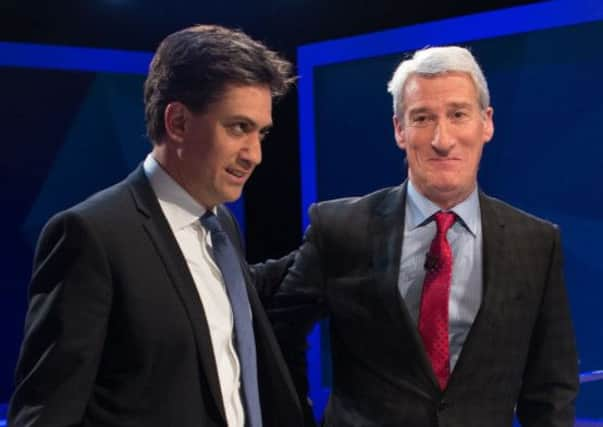Ian Swanson: Party leaders set for big TV debate


It’s the only proper UK-wide TV debate of the campaign after David Cameron vetoed any head-to-head with Ed Miliband.
The Prime Minister starts with ground to make up following last week’s Jeremy Paxman interviews. Although the snap poll on the night said he had won, later surveys – and most commentators – gave it to Mr Miliband.
Advertisement
Hide AdAdvertisement
Hide AdThe fixed-term parliament has taken some of the drama out of the start of the election – the traditional speculation and anticipation of just when it would be called was missing. Everyone has known the date years in advance.
But with the campaign now officially under way, following the dissolution of parliament on Monday, voters can expect a relentless bombardment from now until May 7.
Many of the parties’ key messages are already well-worn. Labour warns that people cannot afford another five years of Tory government; the Tories boast about their “long-term economic plan”; the Liberal Democrats claim they would cut less than the Tories and borrow less than Labour; and the SNP says only electing a strong team of SNP MPs will ensure Scotland’s voice is heard at Westminster.
But will any of the polished soundbites, big posters, party broadcasts, door-to-door canvassing and direct mailings – and the TV confrontations – make any difference?
In 2010 – when Mr Cameron was much more enthusiastic about having TV debates and the then Prime Minister Gordon Brown more willing to agree – the televised showdowns became a major focus of the campaign and seemed to benefit Nick Clegg above all.
The sudden exposure he received allowed him to appeal directly to people who might not have known much about him and to present his party as offering something new and different.
But in the end, the Lib Dems lost seats rather than making gains. The polls currently put Labour and the Tories neck and neck at UK level and show the SNP well ahead of Labour in Scotland. And they have not shifted much for a long time.
A study of last year’s referendum led by Professor Ailsa Henderson from Edinburgh University found that only 1.4 per cent of voters said the TV debates between Alex Salmond and Alistair Darling had changed their minds.
Advertisement
Hide AdAdvertisement
Hide AdAnd research by the British Election Study Team has found that, while Labour hopes there will be a late turnaround with voters planning to back the SNP returning to Labour as the election comes closer, all the evidence suggests that will not happen.
The study found the proportion of those who had voted Yes in the referendum intending to vote SNP had increased from 70 per cent immediately after the referendum to 79 per cent now, so with just weeks to go the trend is still in the Nationalists’ favour.
And not only that, those who have switched from Labour to the SNP are among those least likely to change their mind. The study concluded that while not impossible, it was “very unlikely” former Labour voters would return to the fold on May 7.
But in the high-stakes contest of the general election, no politician is going to stop hoping or working to persuade people to give them their vote.